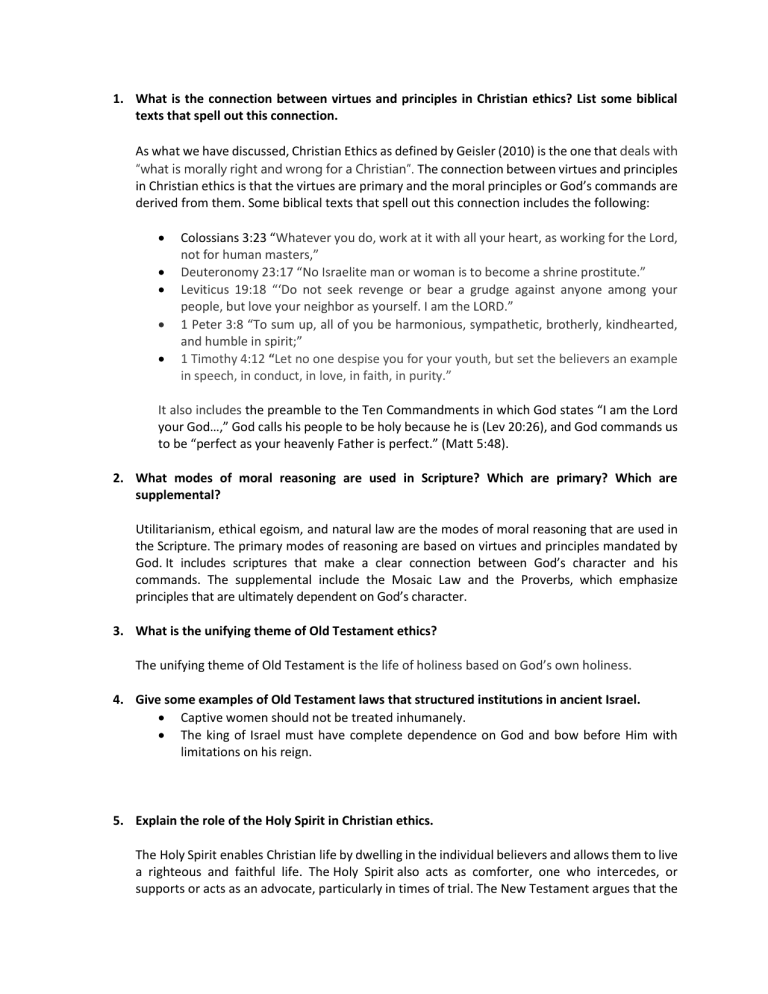
1. What is the connection between virtues and principles in Christian ethics? List some biblical texts that spell out this connection. As what we have discussed, Christian Ethics as defined by Geisler (2010) is the one that deals with “what is morally right and wrong for a Christian”. The connection between virtues and principles in Christian ethics is that the virtues are primary and the moral principles or God’s commands are derived from them. Some biblical texts that spell out this connection includes the following: Colossians 3:23 “Whatever you do, work at it with all your heart, as working for the Lord, not for human masters,” Deuteronomy 23:17 “No Israelite man or woman is to become a shrine prostitute.” Leviticus 19:18 “‘Do not seek revenge or bear a grudge against anyone among your people, but love your neighbor as yourself. I am the LORD.” 1 Peter 3:8 “To sum up, all of you be harmonious, sympathetic, brotherly, kindhearted, and humble in spirit;” 1 Timothy 4:12 “Let no one despise you for your youth, but set the believers an example in speech, in conduct, in love, in faith, in purity.” It also includes the preamble to the Ten Commandments in which God states “I am the Lord your God…,” God calls his people to be holy because he is (Lev 20:26), and God commands us to be “perfect as your heavenly Father is perfect.” (Matt 5:48). 2. What modes of moral reasoning are used in Scripture? Which are primary? Which are supplemental? Utilitarianism, ethical egoism, and natural law are the modes of moral reasoning that are used in the Scripture. The primary modes of reasoning are based on virtues and principles mandated by God. It includes scriptures that make a clear connection between God’s character and his commands. The supplemental include the Mosaic Law and the Proverbs, which emphasize principles that are ultimately dependent on God’s character. 3. What is the unifying theme of Old Testament ethics? The unifying theme of Old Testament is the life of holiness based on God’s own holiness. 4. Give some examples of Old Testament laws that structured institutions in ancient Israel. Captive women should not be treated inhumanely. The king of Israel must have complete dependence on God and bow before Him with limitations on his reign. 5. Explain the role of the Holy Spirit in Christian ethics. The Holy Spirit enables Christian life by dwelling in the individual believers and allows them to live a righteous and faithful life. The Holy Spirit also acts as comforter, one who intercedes, or supports or acts as an advocate, particularly in times of trial. The New Testament argues that the Holy Spirit is an internal source that assists in decision making and enables one to mature spiritually. It produces sanctification in the believer, allowing them to welcome moral and spiritual maturity into their life 6. What is the central virtue in Christian ethics? The central virtue in Christian ethics is the virtue of love. It is the ultimate expression of virtues involved in following Jesus. We are commanded as Christians to love the Lord with all our heart, soul and strength. We are also commanded to love our neighbor as our self. 7. What is the Euthyphro dilemma? How would you begin to resolve it? The Euthyphro Dilemma is a philosophical problem concerned with a view of morality related to theism. It asks: “do the gods love good action because it is good, or is good action good because it is loved by the gods?” One possible response to the Euthyphro Dilemma is to simply accept that if God does command cruelty, then inflicting it upon others would be morally obligatory. 8. How would you define natural law? Natural law proposes that, to be valid, laws should derive from certain fundamental moral premises that are generally accepted as the foundation of proper relations between people in a just society. In other words, they just make sense when you consider the nature of humanity. 9. How would you distinguish between the legal positivists and the moral realists? Legal positivism is a philosophy of law proposing that a law is valid simply by virtue of the fact that it has been approved by a legally constituted authority. In other words, whether some might argue that the law is unfair or unjust based upon moral or ethical arguments is not material to the consideration of its inherent validity. While, Moral Realism is the meta-ethical view that there exists such things as moral facts and moral values, and that these are objective and independent of our perception of them or our beliefs, feelings or other attitudes towards them. Therefore, moral judgments describe moral facts. For instance, “Don’t wish for something bad to happen to your enemy because the universe will cause your karma to come back on you ─ the example is that the universe has an objective moral code called karma. This cannot be proven nor is there evidence for it, yet people still believe in it. 10. Do you think Christian ethics offers high moral standard or just like other ethical cultural values? Explain your answer. In my opinion, Christian ethics offers a high moral standard because it asks what the whole Bible teaches us about which acts, attitudes, and personal character traits receive God’s approval and which ones do not. This means that Christian ethics teaches us how to live. It is important to study Christian ethics so that we can better know God’s will, and so that each day we can “walk in a manner worthy of the Lord, fully pleasing to him” (Col. 1:10).

